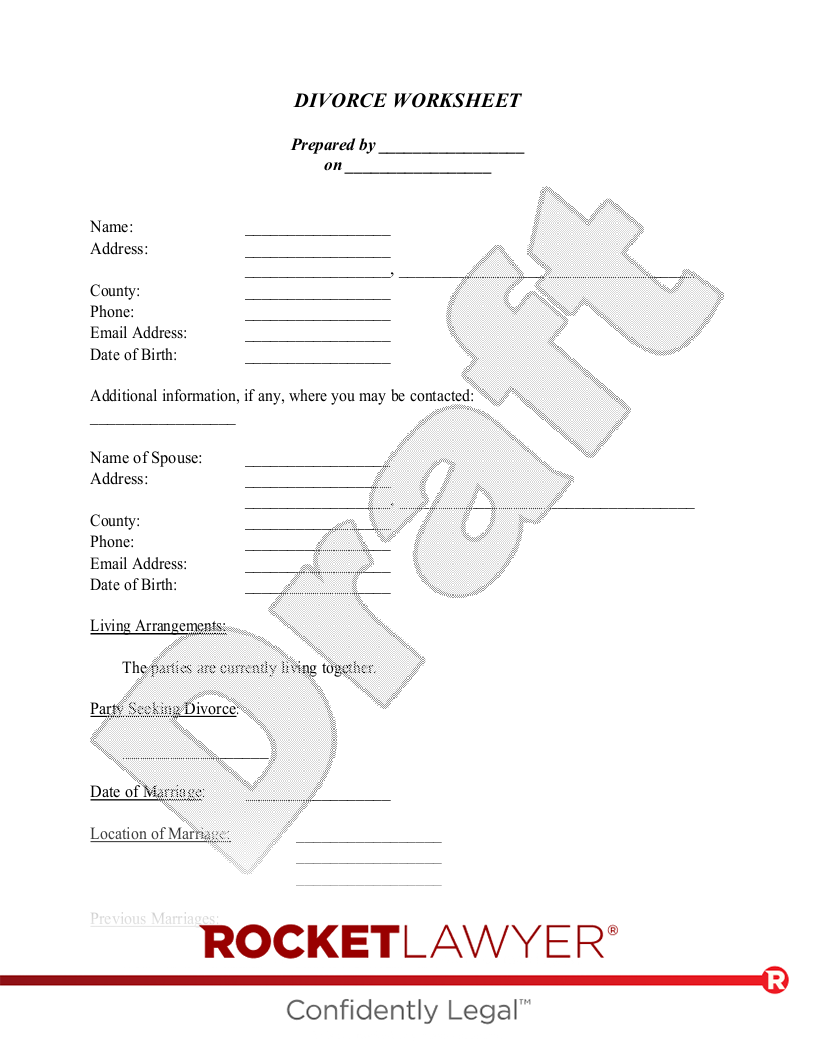Fault vs. No-Fault Divorce
One way divorces are classified is by the grounds for ending the marriage.
No-Fault Divorce
In a no-fault divorce, neither spouse is required to prove that the other caused the breakdown of the marriage. Instead, the filing spouse states that the marriage cannot be repaired.
Common no-fault grounds include:
- Irreconcilable differences.
- Irretrievable breakdown of the marriage.
- Living separately for a required period of time.
Most states now allow no-fault divorce, and many recognize only a single no-fault ground that must be used exactly as written in the statute. No-fault divorce is generally simpler and less adversarial than fault-based divorce.
Fault Divorce
In a fault divorce, the spouse filing claims the other spouse is legally responsible for the breakdown of the marriage.
Fault grounds vary by state and may include:
- Adultery.
- Abandonment or desertion.
- Physical or emotional abuse.
- Substance abuse.
- Incarceration.
- Insanity or impotence.
Fault divorces are often more complex, time-consuming, and expensive. In some states, proving fault can affect issues such as alimony eligibility or the timing of the divorce. Because fault rules vary widely, it’s important to review your state’s specific laws before filing.
Contested vs. Uncontested Divorce
Divorces are also categorized by whether spouses agree on the outcome.
Uncontested Divorce
An uncontested divorce means both spouses agree on all major issues, including:
- Division of property and debts.
- Child custody and parenting time.
- Child support.
- Spousal support (alimony).
Because there are no disputes for a judge to resolve, uncontested divorces are usually faster, less expensive, and less stressful. In many cases, there is no trial, and spouses may not need to appear in court at all.
If you and your spouse can reach agreement, an uncontested divorce is often the simplest and most efficient option.
Contested Divorce
A contested divorce occurs when spouses cannot agree on one or more key issues. These disputes may involve property division, custody, support, or other matters.
Contested divorces often require:
- Court hearings.
- Settlement negotiations.
- Mediation or conferences.
- A trial if no agreement is reached.
Because of the complexity and potential cost of contested divorces, legal representation is often helpful.
A divorce’s grounds (fault or no-fault) and its level of agreement (contested or uncontested) describe different aspects of the case. For example, a no-fault divorce can still be contested, and a fault divorce can be uncontested.
Divorce Types by Special Processes
Beyond legal categories, divorces can also be distinguished by how disputes are resolved and how the case proceeds through the court system.
Collaborative Divorce
A collaborative divorce allows spouses to work toward a settlement without going to court. Each spouse hires a lawyer trained in collaborative practice, and all parties agree to resolve issues cooperatively.
Key features of collaborative divorce include:
- Full disclosure of financial and other relevant information.
- Joint meetings between spouses and their lawyers.
- Use of neutral professionals when needed (such as financial or child specialists).
If the collaborative process fails and the case goes to court, both lawyers must withdraw, and new attorneys must be hired.
A Divorce Settlement Agreement is commonly used in collaborative divorce to document agreements on property, custody, support, and debts.
Default Divorce
A default divorce may occur when one spouse files for divorce and the other spouse fails to respond within the required time.
If service requirements are met and no response is filed, the court may grant the divorce based on the filing spouse’s requests, subject to court approval. Default divorces are less common but may occur when a spouse cannot be located or chooses not to participate.
Summary or Simplified Divorce
Some states offer a summary or simplified divorce process for couples who meet specific criteria, such as:
- Short marriages (often less than five years).
- Little or no shared property.
- No children.
- Minimal joint debt.
These divorces typically require fewer forms, less court involvement, and may not require a lawyer. Both spouses must still agree to the divorce and meet all eligibility requirements.
Choosing the Right Divorce Path
The right type of divorce depends on many factors, including your relationship with your spouse, financial situation, children, and state law requirements. Understanding these options can help you decide how to move forward and when to seek legal guidance.
If you have questions about divorce or need help preparing documents, you can reach out to a Rocket Lawyer network attorney for affordable legal advice or explore tools designed to simplify the divorce process.
Please note: This page offers general legal information, not but not legal advice tailored for your specific legal situation. Rocket Lawyer Incorporated isn't a law firm or a substitute for one. For further information on this topic, you can Ask a Legal Pro.
